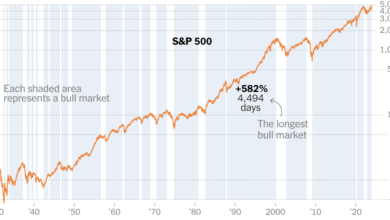Do Americans Trust Tech Giants And AI With Their Money? – Forbes Advisor

Editorial Note: We earn a commission from partner links on Forbes Advisor. Commissions do not affect our editors’ opinions or evaluations.
Technology giants are now established players in the financial industry. Apple’s savings account, launched in April 2023, managed to draw over $10 billion in deposits in just a few months. Elon Musk aims to turn social media app X, formerly known as Twitter, into a financial management hub that would eliminate the need for traditional financial institutions. The integration of artificial intelligence (AI) and banking is only accelerating this transformation.
The financial landscape is poised for a significant shake-up, and it’s one that the majority of consumers seem ready to welcome, according to a recent Forbes Advisor survey. Our latest study dives into how much consumers trust tech giants, or dominant technology companies, with their money and how comfortable consumers are with the rising influence of AI in banking.
Key Takeaways
- A significant majority (74.4%) of survey respondents are somewhat or very likely to use financial products offered by prominent tech figures like Tim Cook (Apple), Mark Zuckerberg (Meta), Jeff Bezos (Amazon) and Elon Musk (X, formerly Twitter).
- According to 42% of survey respondents, tech giants are better equipped to meet consumers’ banking needs than traditional financial institutions.
- Online-only banks like Ally and SoFi are trusted the most (48.9%), followed closely by non-bank fintech companies like Chime (48.8%).
- A majority (54.7%) of respondents are somewhat or very likely to transition entirely away from traditional banking in favor of alternative financial solutions.
- Roughly 72% of respondents view the integration of automated services and AI in the financial market as positive.
- More than half (58.3%) of respondents feel somewhat or very comfortable with the possibility of living in a cashless society.
- The majority of respondents (66.4%) are comfortable with financial transactions becoming predominantly digital and AI-driven.
Most Consumers Are Likely To Use Financial Products From Tech Giants
Tech giants and their leaders—think Tim Cook of Apple, Mark Zuckerberg of Meta, Jeff Bezos of Amazon and Elon Musk of X—are becoming increasingly prominent in the financial landscape, and consumers don’t seem to mind.
Nearly three-quarters of participants (74.4%) say they’re somewhat or very likely to use financial products offered by well-known tech figures. And while nearly one in five participants is neutral, only a small sliver report being unlikely to use these financial products.
The appeal of technology-driven financial products may be due in part to consumers’ views on the capabilities of tech leaders versus traditional financial institutions. More respondents (42%) believe tech giants are better equipped to meet their banking needs than those who don’t (37.9%).
But not all tech-forward financial institutions are seen as equal. Survey respondents have the most faith in online-only banks (like Ally or SoFi) and non-bank financial technology companies (like Chime), with 49% saying they trust these institutions the most with their money. This is followed by traditional banks and credit unions, which 42% of respondents say they trust most. Financial services offered by tech giants, interestingly, came in last (40%).
Why Do Respondents Trust Tech Giants With Their Money?
As mentioned, 42% of respondents think tech giants are able to meet their banking needs better than traditional financial institutions. But why?
The top reason, as reported by 74.8% of respondents, is that tech giants provide more modern, user-friendly platforms. This may be unsurprising for anyone who’s been frustrated trying to navigate an outdated online banking portal.
Seamless websites and mobile banking apps are often deciding factors for consumers seeking a bank account, but so are account features and customer service. Most respondents who sided with tech giants also selected the following reasons for choosing these challengers: better rates and/or lower fees, better customer service and enhanced security.
Find The Best High-Yield Checking Accounts Of 2024
Most Respondents (54.7%) Are Likely To Transition Entirely Away From Traditional Banking
Survey respondents’ enthusiasm for technology-driven financial products and changes in banking trends isn’t just talk—supporters also report they’re ready to make the switch.
The majority (54.7%) of respondents say they’re inclined to leave traditional banking behind in favor of new alternative banking solutions. A much smaller group (17.3%) report the opposite, saying they’re somewhat or very unlikely to do so.
These survey results suggest that an established history and brick-and-mortar branches won’t be enough for traditional banks to maintain their customer bases. Adopting newer technologies and offering more competitive products might help these institutions stay relevant.
Most Consumers Welcome AI Integration in Financial Services
Artificial intelligence is a hot topic of conversation in many industries, and finance is no exception. Today, banking virtual assistants, robo-advisors and chatbots are common.
According to the majority of our survey respondents, AI is a welcome addition to the financial landscape. Nearly three-quarters (72.1%) view the integration of automated services, such as live chat and AI, in the financial services market as somewhat or very positive. Another 19% are neutral, feeling neither negative nor positive about this integration. Only 8.9% of respondents hold a negative opinion of AI integration in financial services.
These data show an overwhelmingly positive or neutral perspective on the evolving technological landscape within the financial industry.
With online security being a primary concern for banking customers, our survey considered not only how respondents feel about AI but also how much they do or don’t trust it. Most respondents (57.2%) completely or somewhat trust AI-run services with their personal data and security. Only 13.5% completely or somewhat distrust these services, and another 29.3% remain neutral, neither trusting nor distrusting AI-run services with their data and security.
The Majority of Respondents (59%) Trust AI To Invest Their Money
Robo-advisors use AI to make investment decisions, often with a more affordable price tag than human financial or investment advisors. Some investors appreciate this automated approach, while others prefer to be more actively involved. Regardless, the majority of survey respondents (59%) trust services that use AI to invest their money. Only one in seven respondents doesn’t trust these services.
An even larger percentage of respondents (66.4%) feel very or somewhat comfortable with their financial transactions and interactions becoming more digital and AI-driven. Meanwhile, about one in ten (10.3%) respondents reports feeling very or somewhat uncomfortable with this shift.
Roughly 58% of Respondents Feel Comfortable Living in a Cashless Society
The use of physical cash is becoming uncommon as online banks and digital wallets make it easy to get by without it. A majority of survey respondents are ready to part ways with physical currency, with 58.3% feeling comfortable with the idea of a cashless society. However, nearly one in six (16.9%) respondents still feel somewhat or very uncomfortable with the idea.
These results suggest that while more consumers may be drawn to cashless banking capabilities and tools, access to cash is still important to some.
Find The Best Online Banks Of 2024
Methodology
This online survey of 1,000 general population Americans was commissioned by Forbes Advisor and conducted by market research company OnePoll, in accordance with the Market Research Society’s code of conduct. Data was collected on December 5, 2023. The margin of error is +/- 3.1 points with 95% confidence. This survey was overseen by the OnePoll research team, which is a member of the MRS and has corporate membership with the American Association for Public Opinion Research (AAPOR).





